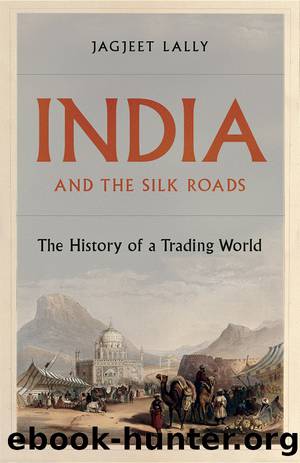India and the Silk Roads by Jagjeet Lally

Author:Jagjeet Lally
Language: eng
Format: epub
Publisher: Hurst Publishers
Published: 2021-11-29T00:00:00+00:00
8
TECHNOLOGY
Railways. Steamships. Telegraphy. Now synonymous with the timeâspace compression that accelerated circulation and globalisation in the nineteenth century, these were also among the premier technologies of the New Imperialism, of empire building by the Great Powers in the uncharted or unclaimed continental interiors. So integral were these technologies, in fact, that historians have coined the term âtechno-imperialismâ to describe the design and use of technology in pursuit of imperial ambitions in this period.1 There were, however, variations in the degree of direct control states exercised over what were, themselves, technologies of control: telecommunications technologies were wholly a state enterprise in late-nineteenth-century Japan but in the hands of private entrepreneurs in the United States, for instance.2 There were also differences in the domains within which techno-imperialism operated. Railways tended not to cross boundaries between empires, but railway construction is classically linked to strategies of British informal empire in Argentina, to take one example.3 The British used steamships as an instrument of informal imperialism in Ottoman Iraq, while co-operation was necessary in the provision of ancillary technologies such as lighthouse facilities in British and Dutch-controlled south-east Asia. Presumably this is because lighthouses belong (unusually) to the class of pure public goods, with all the problems of free riding and all the benefits of imperial prestige and improved safety deriving from concern for shipping and shipmen.4 These examples highlight the variously formal or informal, imperial, inter-imperial, or trans-imperial contexts of these technologiesâ operation. Unsurprisingly, while their impact was everywhere apparent in the imperial metropoles, and palpable even in the farthest corners of empires, the precise effects of these technologies were often difficult to pin down with precision, let alone to predict before their inauguration. These were at once instruments of governance and, yet, were themselves unruly, capable of producing alternative logics of power or mobility to those desired by the coloniser. Were investments in these technologies buttressing imperial political and economic power and prestige? Were they being exploited by rivals or enemies of the state?
In this context, the Punjab government deputed Captain H. Grey in 1872 to determine more precisely the impact of British rule in north-west India upon the annual caravan trade. Grey duly engaged three Powinda merchants from the Khel and Kharoti tribes: Behar Khan, Khoedad Khan Zakori, and Muhammad Khan Kharoti. He began by asking them: âHas the Gomul trade increased since the commencement of British rule, and what are the causes?â Khoedad Khan Zakori replied that âprofits under former rules were larger than now, as the telegraph now keeps everyone informed of the prices existing in other places, and special heavy prices are not, therefore, to be obtainedâ.5 The telegraph was not mentioned again in either the interview transcript or the report; after all, there was no PeshawarâKabul line, and the Afghan amir vehemently refused the laying of the line into the late 1880s.6 But the point was taken up, albeit briefly, by Grey: âThis is a matter which cannot be interfered with, and may be expected to act as much in favour of as against the trader.
Download
This site does not store any files on its server. We only index and link to content provided by other sites. Please contact the content providers to delete copyright contents if any and email us, we'll remove relevant links or contents immediately.
The European History Highway: A Guide to Internet Resources by Dennis A. Trinkle Scott A. Merriman(384)
European Security without the Soviet Union by Stuart Croft Phil Williams(380)
European Security in a Global Context by Thierry Tardy(343)
The Seven Wonders of the Ancient World by Michael Denis Higgins(312)
The Routledge companion to Christian ethics by D. Stephen Long Rebekah L. Miles(305)
Governance, Growth and Global Leadership by Espen Moe(279)
Gorbachev And His Generals by William C. Green(274)
Get Real with Storytime by Julie Dietzel-Glair & Marianne Crandall Follis(257)
Tibetan Studies in Comparative Perspective by Chih-yu Shih Yu-Wen Chen(248)
The Oxford History of the World by Fernández-Armesto Felipe;(236)
The Oxford Handbook of the Incas by Sonia Alconini(212)
Oral Poetry and Narratives from Central Arabia: The Poetry of Ad-Dindan : A Bedouin Bard in Southern Najd (Studies in Arabic Literature, Vol 17) (English and Arabic Edition) by P. M. Kupershoek P. Marcel Kurpershoek(206)
A Cultural History of Marriage in Antiquity by Karen Klaiber Hersch;(189)
The Hutchinson Dictionary of Ancient and Medieval Warfare by Peter Connolly John Gillingham John Lazenby(187)
The Egyptian Economy, 1952-2000 by Khalid Ikram(186)
How Languages Are Learned 5th Edition by Patsy M Lightbown;Nina Spada; & Nina Spada(180)
Europe Contested by Harold James(176)
CliffsNotes on Fitzgerald's The Great Gatsby by Kate Maurer(174)
India and the Silk Roads by Jagjeet Lally(158)
